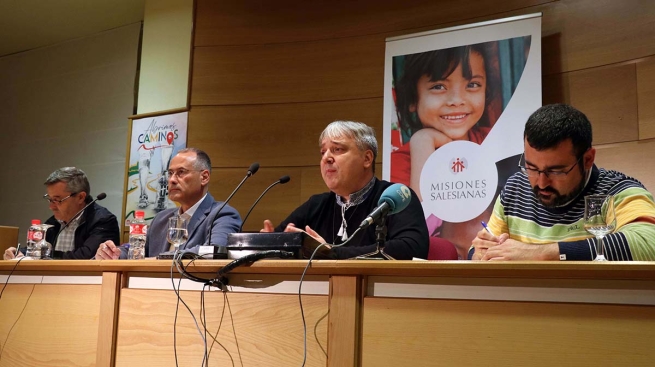The war has so far resulted in 8 million refugees and 5.3 million internally displaced persons. Over 200,000 people have been killed, including 18,000 civilians and nearly 500 children. In the education sector, 2,700 schools have been bombed, more than 500 destroyed. Only in five of the country's 25 regions has it been possible to resume normal classes.
In response to this situation caused by the war, the Salesians have responded with three initiatives, as Fr. Mykhaylo Chaban explains: "reception of displaced people in Ukraine and relocation to safe areas; housing and assistance in neighboring countries; and education in emergency situations."
Forty Salesians operate in 11 works in nine cities. External support is crucial. Soon after the conflict broke out, "Misiones Salesianas" launched the "Ukraine Emergency" campaign, which has, to date, sent over 650,000 euros in aid. "This is an opportunity to say thank you. The victims of this conflict feel your closeness, that of all Salesian houses around the world and that of Misiones Salesianas," Fr. Chaban said at a press conference held on Thursday morning, May 18, at the Salesian headquarters in Madrid.
During these 15 months, the Salesians in Ukraine have adapted to the population's actual needs. One of the "drastic decisions" made was to take a group of young people under guardianship out of the country "so that the war would not do them any harm."
"We have more than 100 IDPs who will continue to live with us until the situation improves," Fr. Chaban added. While "two Salesians go to the war front to bring food and medicine, and on the return trip they help women and the elderly relocate."
While adapting to the circumstances, the Salesians are also trying to return to their pre-war routine. "Since September we have been able to resume 'normal' activities in the school, youth center, and oratory," said the UKR Superior.
Also underway is the Mariapolis Project, "a modular city built in cooperation with the municipality, where we hope to build a middle and high school for 750 children."
One of the initiatives undertaken by Salesians in cities such as Kyiv or Dnipro is the "Oratory on Wheels" - animation activities that can be transferred from place to place: in this way, "we have been able to work with young people who are suffering psychological damage as a result of the occupation," Fr. Chaban underscored, while illustrating the accompaniment being offered when a young person loses a family member in the war.
However, according to the Salesian, it is still too early to address the feelings of hatred that arise among young people toward Russia and Russophones: "The time is probably not now, but when there will be peace. Before the war, there was no such feeling of hatred."
Contrary to what one might expect, faith seems to have increased among the Ukrainian people. "According to statistics, 84 percent of Ukrainians are believers. The number of atheists has dropped from 5 to 2 percent. The war has made many Ukrainians rethink eternity," said the Salesian Superior.
On the religious front, Fr. Mykhaylo Chaban noted the joint work among the different Christian churches and the "spontaneous coordination among congregations. Superiors talk to each other to share needs for food, medicine, etc."
Finally, Fr. Chaban wanted to spend a few words to assure that he felt "the closeness of the Holy Father, who thinks of the Ukrainian people, who prays for Ukraine. I think his desire is clear: that Ukraine will recover the peace that the people desire. We know that the Vatican has made efforts to achieve this goal. However, there are issues that need to be addressed by politicians."
https://www.infoans.org/en/sections/news/item/18031-spain-fr-mykhaylo-chaban-salesian-in-ukraine-the-victims-of-this-conflict-feel-your-closeness#sigProId8800cc24b8



